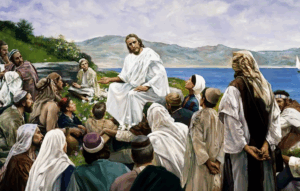 Editors’ note: To contextualise these translations of Karlheinz Deschner’s encyclopaedic history of the Church in 10-volumes, Kriminalgeschichte des Christentums, read the abridged translation of Volume I. In the previous chapter, not translated for this site, the author describes the high level of education in the Greco-Roman world before the Christians burned entire libraries and destroyed an amazing quantity of classical art.
Editors’ note: To contextualise these translations of Karlheinz Deschner’s encyclopaedic history of the Church in 10-volumes, Kriminalgeschichte des Christentums, read the abridged translation of Volume I. In the previous chapter, not translated for this site, the author describes the high level of education in the Greco-Roman world before the Christians burned entire libraries and destroyed an amazing quantity of classical art.
Since the time of Jesus Christianity has taught to hate everything that is not at God’s service
The Gospel was originally an apocalyptic, eschatological message, a preaching of the imminent end of the world. The faith of Jesus and his disciples was, in this respect, firm as a rock, so that any pedagogical question lacked any relevance for them. They did not show the slightest interest in education or culture. Science and philosophy, as well as art, did not bother them at all.
We had to wait no less than three centuries to have a Christian art. The ecclesiastical dispositions, even those enacted in later times, measure artists, comedians, brothel owners and other types with the same theological standard.
Soon it was the case that the ‘fisherman’s language’ (especially, it seems, that of the Latin Bibles) provoked mockery throughout all the centuries, although the Christians defend it ostensibly. This, in despite Jerome and Augustine confess on more than one occasion how much horror is caused by the strange, clumsy and often false style of the Bible. Augustine even said it sounded like stories of old women! (In the 4th century some biblical texts were poured into Virgil hexameters, without making them any less painful.) Homines sine litteris et idiotae (illiterate and ignorant men), thus the Jewish priests describe the apostles of Jesus in the Latin version of the Bible.
As the Kingdom of God did not come upon the Earth, the Church replaced it with the Kingdom of Heaven to which the believers had to orient their entire lives. This meant according the plans of the Church; for the benefit of the Church, and in the interest of the high clergy. For whenever and wherever this clergy speaks of the Church, of Christ, of God and of eternity, it does so solely and exclusively for their own benefit. Pretending to advocate for the health of the believer’s soul, they thought only of their own health. All the virtues of which Christianity made special propaganda, that is, humility, faith, hope, charity, and more, lead to that final goal.
In the New Testament it is no longer human pedagogy what matters, which is barely addressed. What is at stake is the pedagogy of divine redemption.
In the work of Irenaeus, creator of a first theological pedagogy, Clement of Alexandria, Origen, Gregory of Nazianzus and Gregory of Nyssa, the idea of a divine pedagogy is often discussed and God becomes the proper educator. Ergo all education must, in turn, be engaged in the first and last line of God and this must be his role.
That is why Origen teaches that ‘we disdain everything that is chaotic, transient and apparent and we must do everything possible to access life with God’. Hence, John Chrysostom requires parents to educate ‘champions of Christ’ and that they should demand the early and persistent reading of the Bible. Hence, Jerome, who once called a little girl a recruit and a fighter for God, wrote that ‘we do not want to divide equally between Christ and the world’.
‘All education is subject to Christianization’ (Ballauf). Nor does the Doctor of the Church Basil consider ‘an authentic good he who only provides earthly enjoyment’. What was encouraged is the ‘attainment of another life’. That is ‘the only thing that, in our opinion, we should love and pursue with all our strength. All that is not oriented to that goal we must dismiss as lacking in value’.
Such educational principles that are considered chimerical, or ‘worthless’ (everything that does not relate to a supposed life after death), find their foundation even in Jesus himself: ‘If someone comes to me and does not hate his father, his mother, his wife, his children, his brothers, his sisters and even his own life, he can not be my disciple’.
How many misfortunes such words have been sowing for two thousand years…







